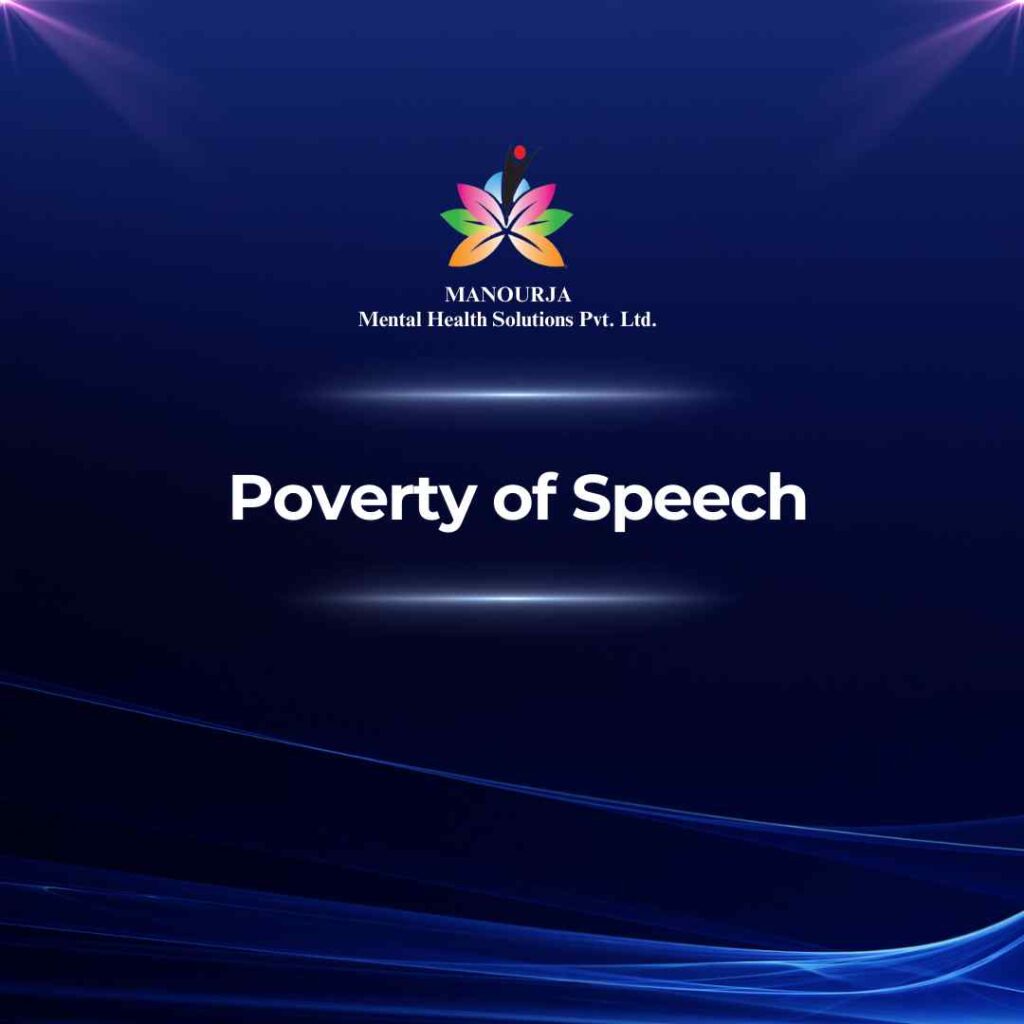Poverty of Speech

“Poverty of speech” refers to a reduction in the amount or frequency of speech output. Individuals experiencing this symptom may speak very little, use few words or phrases, and generally communicate in a sparse or minimalistic manner. This reduction in speech can be characterized by brief responses, limited elaboration on topics, and a general lack of spontaneous conversation.
Poverty of Speech as a Sign and Symptom of Mental Illness
Poverty of speech is typically considered a negative symptom of schizophrenia and other psychotic disorders. Negative symptoms involve deficits in normal emotional, cognitive, or behavioral functioning. Poverty of speech specifically affects verbal communication and can lead to social withdrawal, difficulties in expressing thoughts or emotions, and impaired social interactions.
Mental Illnesses with Poverty of Speech as Symptoms
Poverty of speech can occur in the following mental health disorders:
- Schizophrenia: In schizophrenia, poverty of speech is often associated with other negative symptoms such as poverty of content of speech (lack of meaningful content), flat affect (reduced emotional expression), and avolition (lack of motivation or initiative). Individuals may speak infrequently, provide minimal responses, and struggle to engage in sustained conversations.
- Schizotypal Personality Disorder: Individuals with schizotypal personality disorder may also exhibit poverty of speech, characterized by limited verbal output, difficulty initiating or maintaining conversations, and reduced elaboration on topics.
- Depressive Disorders: During severe depressive episodes, individuals may experience poverty of speech as part of overall psychomotor retardation or reduced cognitive processing. This can include speaking less, slower speech, and decreased interest in communication.
- Brief Psychotic Disorder: Poverty of speech can occur during acute episodes of brief psychotic disorder, which involve sudden onset of psychotic symptoms such as hallucinations, delusions, and disorganized thinking.
- Autism Spectrum Disorders (ASD): In ASD, individuals may exhibit poverty of speech as part of communication difficulties characteristic of the disorder. This can include limited use of language, echolalia (repetition of words or phrases), and challenges in initiating or sustaining conversations.
Managing and Treating Poverty of Speech
Treatment for poverty of speech focuses on addressing underlying symptoms and improving overall communication and social functioning:
- Medication: Antipsychotic medications may be prescribed for schizophrenia and psychotic disorders to manage symptoms, including poverty of speech, by targeting neurotransmitter imbalances in the brain.
- Therapy: Cognitive-behavioral therapy (CBT), social skills training, and speech therapy can help individuals improve communication skills, increase verbal fluency, and learn strategies for initiating and maintaining conversations.
- Supportive Interventions: Providing a supportive environment, promoting social interactions, and encouraging participation in therapeutic activities can help individuals build confidence and improve communication abilities.
- Family and Community Support: Involving family members and caregivers in treatment planning, education about symptoms, and providing resources for support can enhance treatment adherence and overall outcomes.
Recognizing poverty of speech as a symptom of an underlying mental health condition is crucial for accurate diagnosis and effective treatment planning. Addressing this symptom through comprehensive and individualized approaches can help individuals improve communication abilities, enhance social interactions, and achieve better overall quality of life.
At MANOURJA, we believe in the transformative power of counseling. Our experienced therapists offer a safe and supportive space where you can explore your thoughts, emotions, and challenges. Through personalized counselling sessions, we’ll work together to develop coping strategies, build resilience, and achieve lasting positive change. Discover the path to a healthier, happier you with MANOURJA counselling services.
MANOURJA Rehabilitation Services
At MANOURJA, we’re dedicated to helping you in rebuild your life, after difficult times. Our rehabilitation services focus on understanding what you need to move forward, whether you’re recovering from addiction, trauma, or any psychological – social challenges. We create personalized plans, that are all about helping you, regain your strength and find hope again. With a caring team by your side, you’ll have the support to make real progress and take steps toward a brighter, healthier future.
